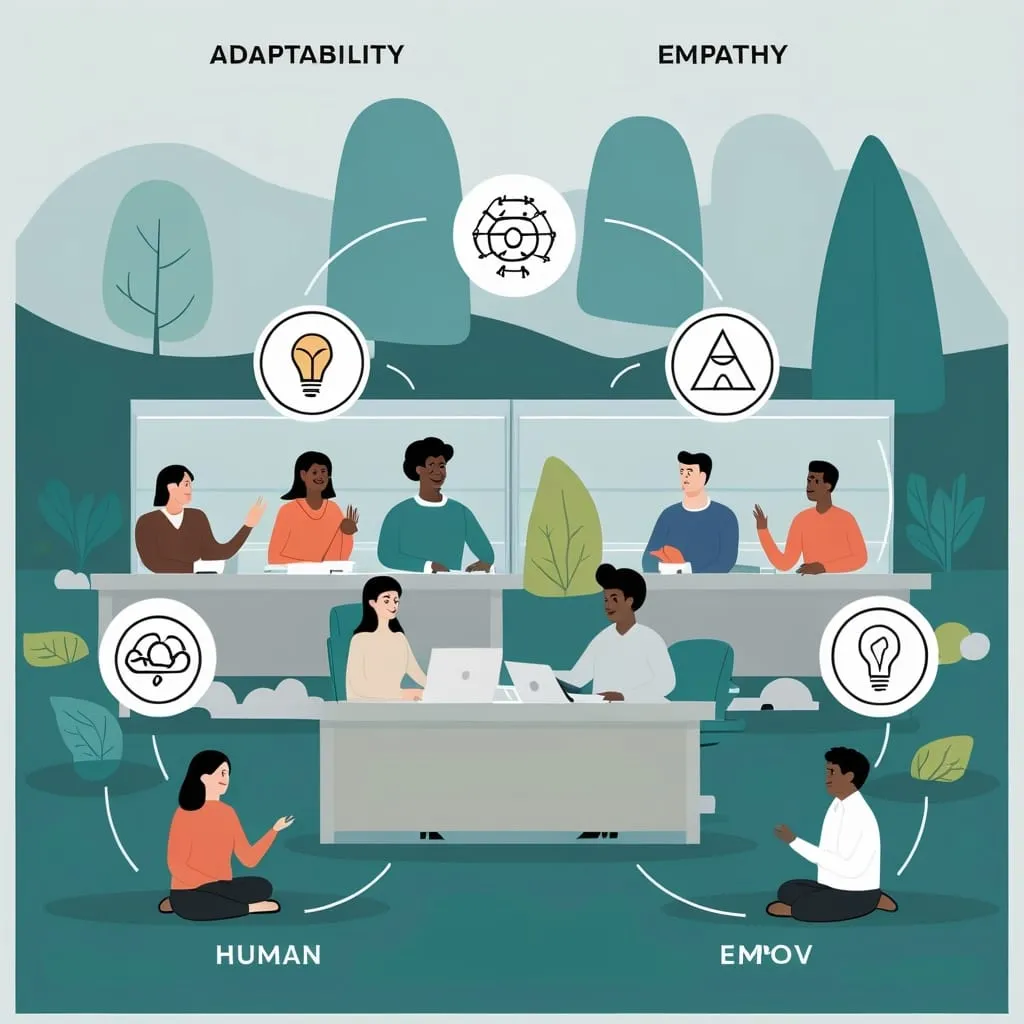Leadership in the Post-Pandemic World: Embracing Change and Empowering Teams
The COVID-19 pandemic has turned the business world upside down, forcing leaders to adapt quickly to unprecedented challenges. As we emerge from this global crisis, it's clear that the landscape of leadership has undergone a significant transformation. The skills and strategies that were once considered optional have now become essential for success in this new era.
Let's dive into the key aspects of leadership that have taken center stage in the post-pandemic world.
Agility and Adaptability: The New Normal
Remember when we used to have carefully laid out five-year plans? Well, those days are long gone. The pandemic taught us that change can happen in the blink of an eye, and leaders need to be ready to pivot at a moment's notice.
Think about it - companies that quickly adapted their operations to meet the sudden shift in demand were the ones that not only survived but thrived during the crisis. It's like being a surfer riding the waves of change - you need to be able to read the situation and adjust your stance accordingly.
But it's not just about reacting to change; it's about anticipating it. Leaders who are constantly scanning the horizon for potential disruptions and opportunities are the ones who will stay ahead of the curve.
Data-Driven Decision Making: The Power of Information
In today's fast-paced world, gut feelings just don't cut it anymore. The pandemic highlighted the importance of making decisions based on solid data rather than hunches or assumptions.
Imagine trying to navigate through a dense fog without any instruments. That's what it's like trying to lead a company without leveraging data. With the right information at your fingertips, you can make informed decisions quickly and confidently.
But here's the thing - it's not just about collecting data. It's about knowing how to interpret it and turn it into actionable insights. Leaders who can do this effectively are like modern-day alchemists, turning raw information into gold.
Empathy and Emotional Intelligence: The Human Touch
Let's face it - the pandemic has been tough on everyone. As a leader, it's not enough to just focus on the bottom line anymore. You need to be able to connect with your team on a human level.
Think of it like being the captain of a ship during a storm. Yes, you need to steer the ship in the right direction, but you also need to make sure your crew is holding up okay. Checking in regularly, offering support, and being understanding of personal challenges are all part of the job now.
And it's not just about being nice - it's about creating a work environment where people feel valued and supported. When your team feels that you genuinely care about their wellbeing, they're more likely to go above and beyond for the company.
Purpose and Values-Driven Leadership: More Than Just Profit
Gone are the days when a company's sole purpose was to make money. Today's leaders need to have a clear sense of purpose that goes beyond the bottom line.
It's like being the conductor of an orchestra. Sure, you want to put on a great performance, but you also want to create something meaningful that resonates with your audience.
Leaders who can articulate and embody their organization's values are the ones who will inspire and engage their teams. And it's not just about talking the talk - you need to walk the walk too. Your actions need to align with your words if you want to build trust and credibility.
Flexibility and Availability: Always On (But Not Burning Out)
With remote work becoming the norm, the traditional 9-to-5 workday has gone out the window. Leaders need to be more flexible and available than ever before.
But here's the catch - you can't be available 24/7 without burning out. It's about finding the right balance. Maybe you have virtual office hours where your team knows they can reach you. Or perhaps you make it a point to check in with each team member regularly.
The key is to create a sense of accessibility without sacrificing your own wellbeing. It's like being a good parent - you want to be there for your kids, but you also need to take care of yourself.
Resilience and Sustainability: Built to Last
If the pandemic taught us anything, it's that we need to be prepared for the unexpected. Leaders need to build resilience into their organizations - not just to weather storms, but to come out stronger on the other side.
Think of it like building a house. You don't just want it to look good; you want it to withstand whatever Mother Nature throws at it. That means investing in solid foundations, using durable materials, and planning for various scenarios.
But resilience isn't just about surviving - it's about thriving. Leaders need to foster a growth mindset within their teams, encouraging innovation and learning from failures.
Clear Priorities and Resource Management: Doing More with Less
In a world where resources are often limited, leaders need to be masters of prioritization. It's not about doing everything - it's about doing the right things.
Imagine you're packing for a trip but you can only take one suitcase. You need to carefully choose what to bring, focusing on the essentials and leaving behind the nice-to-haves.
The same principle applies to leadership. You need to identify the high-impact activities that will move the needle for your organization and focus your resources there. It's about working smarter, not harder.
Navigating Supply Chain Disruptions: Expecting the Unexpected
The pandemic exposed the fragility of global supply chains, and leaders need to be prepared for future disruptions. It's not just about having a Plan B - you need a Plan C, D, and E too.
Think of it like playing chess. You need to anticipate multiple moves ahead and have strategies in place for various scenarios. This might mean diversifying your supplier base, investing in local production, or exploring new technologies like 3D printing.
Remote and Hybrid Work Models: The Future of Work
Remote work is here to stay, and leaders need to adapt their strategies accordingly. It's not just about providing the right tools and technology - it's about fostering a sense of connection and engagement in a virtual environment.
Imagine trying to build a strong team when everyone is scattered across different locations. It's challenging, but not impossible. You need to be intentional about creating opportunities for collaboration, socializing, and team building.
And let's not forget about performance management. The old metrics might not apply in a remote work environment. Leaders need to rethink how they measure productivity and success in this new world of work.
Transparency and Strategic Planning: Looking Ahead
In times of uncertainty, transparency is key. Leaders need to be open and honest with their teams about the challenges they're facing and involve them in problem-solving.
It's like being the captain of a ship again. You need to keep your crew informed about the journey ahead, including any potential storms or obstacles. By involving them in the navigation process, you're not only building trust but also tapping into their collective wisdom.
And while you're navigating the present, you also need to keep an eye on the future. Strategic planning is more important than ever in a rapidly changing world. It's about finding the right balance between short-term responses and long-term vision.
In conclusion, leadership in the post-pandemic world is about embracing change, empowering teams, and staying true to your values. It's about being agile yet grounded, data-driven yet empathetic, flexible yet focused.
As we move forward, the lessons learned during the pandemic will continue to shape how we lead. The challenges may be great, but so are the opportunities. By developing these essential skills and strategies, leaders can guide their organizations to not just survive, but thrive in the new normal.
Remember, great leadership isn't about having all the answers - it's about asking the right questions and inspiring your team to find innovative solutions. So, are you ready to lead in this brave new world?






